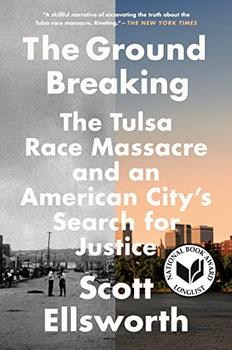Summary | Excerpt | Reviews | Beyond the Book | Readalikes | Genres & Themes | Author Bio

An American City and Its Search for Justice
by Scott Ellsworth
There are no toilet facilities in the shine parlor for Dick Rowland and the other African American bootblacks. So the white owner has arranged for his employees to use the "Colored" restroom on the top floor of the Drexel Building, a block away on Main Street. This is where Rowland is headed now. To get to the washroom, he must ride the elevator located in the back of the building. The elevator is operated by Sarah Page, a white seventeen-year-old who, it is said, is saving her money to attend night school. At the very least, Sarah knows Dick and all the other shoeshiners by sight, as she carries them up to the fourth floor and back down again practically every day.
Only today is not like all the others.
Shortly after Dick enters the Drexel Building, Sarah screams.
And Dick is seen running away.
The police are summoned. Two detectives arrive and speak with Sarah. But they do not appear to be overly concerned. No all-points bulletin is issued, no squads of armed officers are dispatched on a manhunt. For whatever happened or did not happen in the elevator, Sarah Page will not press any charges. A white clerk in RenbergÕs, a high-quality clothing store located on the ground floor of the Drexel Building, however, is convinced that he knows just as plain as day what occurred between Rowland and Page. And while he did not actually witness anything, he talks to anyone who will listen.
The next morning, police officers arrive at Damie Rowland's home in Greenwood.
They don't stay long.
Dick Rowland is arrested and is taken downtown. He's booked at police headquarters and then, pending arraignment, is locked inside a jail cell located on the top floor of the county courthouse.
By late afternoon, there is lynch talk on the streets of white Tulsa.
But in Greenwood, there is talk of a different kind. At the Dreamland Theatre, an angry veteran jumps up onstage. "We're not going to let this happen," he shouts. "We're going to go downtown and stop this lynching. Close this place down."
Tuesday evening, May 31, around 7:00.
By now, more than three hundred white men, women, and children are gathered outside the Tulsa County Court House, a handsome Greek revival edifice located at Sixth Street and Boulder Avenue, along the southern edge of downtown. In the soft spring twilight, with the sky slowly turning pink and gold, they pack the nearby sidewalks and have spilled out into the streets. The women are wearing straw hats and light summer dresses, the men in overalls, suits, or dress shirts and ties. Groups of twos and threes and fours are talking and smoking, some sitting on the grass in the front yards of nearby houses. The mood is light and celebratory, with mockingbirds and chickadees chattering in the nearby oaks and elms. But the crowd is also determined, and expecting action.
Only nine months earlier, a large crowd of whites had gathered on these same streets and sidewalks. They had come to demand the release, into their custody, of a white eighteen-year-old former telephone company worker named Roy Belton, who had been charged with the cold-blooded murder of a white Tulsa taxicab driver. Belton had been arrested and was being held in a jail cell on the top floor of the courthouse when the crowd gathered and pressed its demand. At first, the sheriff refused. "Let the law take its course," he said. "The electric chair will get him before long." But it was all a show. When a handful of armed men wearing masks appeared at the courthouse door, the sheriff willingly handed over his prisoner. "We got him, boys! We got him!" the men shouted as they led Belton out of the courthouse. Within a half hour, Roy Belton was lynched a few miles outside town. Tulsa police officers directed traffic.
"It is my honest opinion," the police chief was quoted a couple of days later, "that the lynching of Belton will prove of real benefit to Tulsa." The sheriff agreed, stating that "it shows to the criminal that the men of Tulsa mean business." So did the Tulsa World, the city's morning newspaper. "There was not a vestige of the mob spirit in the act of Saturday night," it argued. "It was citizenship, outraged by government inefficiency and a too tender regard for the professional criminal."
Excerpted from The Ground Breaking by Scott Ellsworth. Copyright © 2021 by Scott Ellsworth. All rights reserved. No part of this excerpt may be reproduced or reprinted without permission in writing from the publisher.
Your guide toexceptional books
BookBrowse seeks out and recommends the best in contemporary fiction and nonfiction—books that not only engage and entertain but also deepen our understanding of ourselves and the world around us.